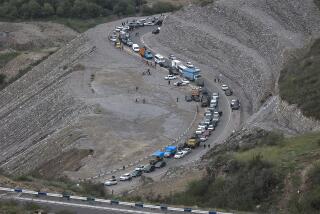Federal Presidency Accepts Peace Plan : Yugoslavia: Approval of the EC agreement may help avoid large-scale violence but probably won’t preserve the nation in its present form.
- Share via
ZAGREB, Croatia — The Yugoslav presidency announced early today that it had accepted a plan brokered by European Community diplomats hoping to head off a civil war in Yugoslavia.
In a statement issued in Belgrade, the federal capital, after nearly 14 hours of talks, the collective presidency endorsed the agreement worked out by a three-member EC mission last Sunday on the Adriatic island of Brioni.
The presidency, which includes all of Yugoslavia’s eight republics and provinces except breakaway Slovenia, which refused to attend, also approved the assignment of about 50 EC observers to monitor compliance with the peace plan.
The EC plan calls for an internationally monitored cease-fire and immediate talks between the federal government and the country’s six republics on the future of Yugoslavia, and for the major issues to be resolved by October.
It also provides for Slovenes to control the republic’s international border posts but to pay customs revenues into a special federal account.
The peace plan has already been approved by the rebellious republics of Slovenia and Croatia as well as the federal Cabinet.
Tanjug, the state news agency, reported that the presidency, while endorsing the plan, also called for changes in it, including the demobilization of all armed groups except the national army and police. The EC plan had sought a more modest demobilization.
While approval of the week-old cease-fire agreement by the collective presidency provides a badly needed glimmer of hope that large-scale violence might be avoided in the short term, few believe that it can save the Yugoslav state in anything like its present form.
Slovenia, the northernmost constituent republic, already sees itself as independent and, after several days of fighting earlier this month, views the EC-administered peace plan chiefly as a way to complete this independence peacefully.
As the collective presidency debated the EC plan Friday, federal leaders admitted that they were fast losing control of developments.
“Events are slipping beyond the control of federal and state authorities in Croatia,” Yugoslav Prime Minister Ante Markovic said in a written Cabinet statement.
“Armed actions by political groups and parties . . . could lead to unimaginable consequences,” the statement concluded.
The reference was to a series of recent attacks launched by Serb and Croat extremist groups operating with increased boldness in parts of eastern Croatia.
The statement, which followed a regular Cabinet meeting, came on a day of continued low-level violence in the Slavonia region of Croatia and reports of military activity elsewhere.
These events have contributed to a growing sense of inevitability that Yugoslavia is entering the twilight of its life as a viable political entity.
Croatia, which also declared itself independent last month, on Friday underscored its own determination to leave the Yugoslav federation.
In a radio interview, the republic’s president, Franjo Tudjman, said Croatia would “be as independent as Denmark or Norway” when a self-imposed suspension of its declaration ends in three months.
Political observers in Belgrade believe that both federal authorities and the leadership of Serbia, the country’s largest, most powerful republic, may now be reconciled to the departure of Slovenia but--because of the large ethnic Serbian population in Croatia--would almost certainly strongly resist Croatia’s attempts to follow.
Isolated incidents of violence broke out again Friday in Croatia’s ethnically mixed eastern Slavonia region.
A Croatian Ministry of Information official said Friday that 42 people have been killed and more than 180 wounded in such clashes over the past year.
More to Read
Sign up for Essential California
The most important California stories and recommendations in your inbox every morning.
You may occasionally receive promotional content from the Los Angeles Times.













